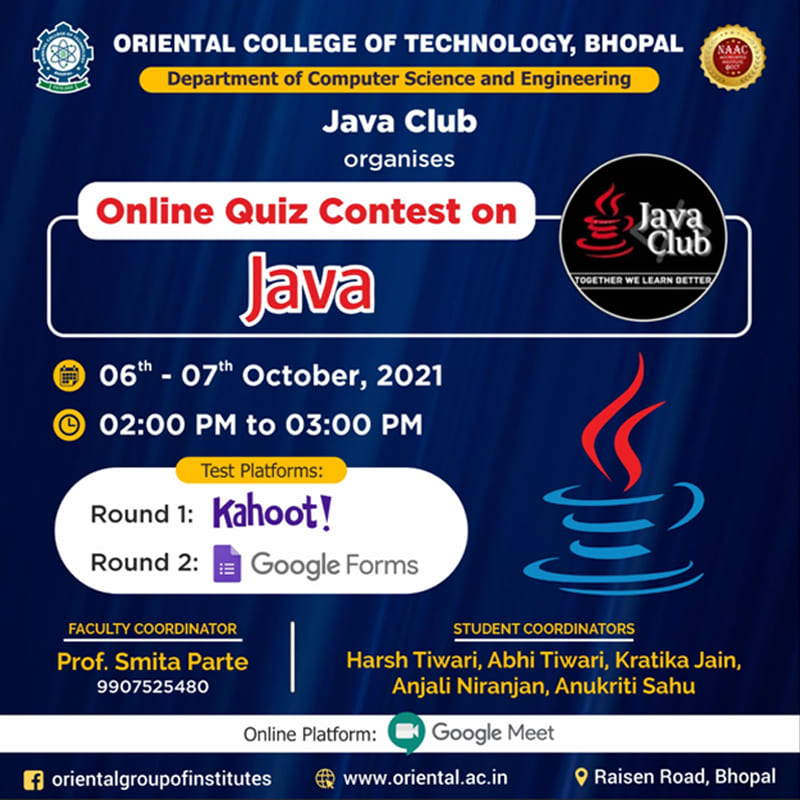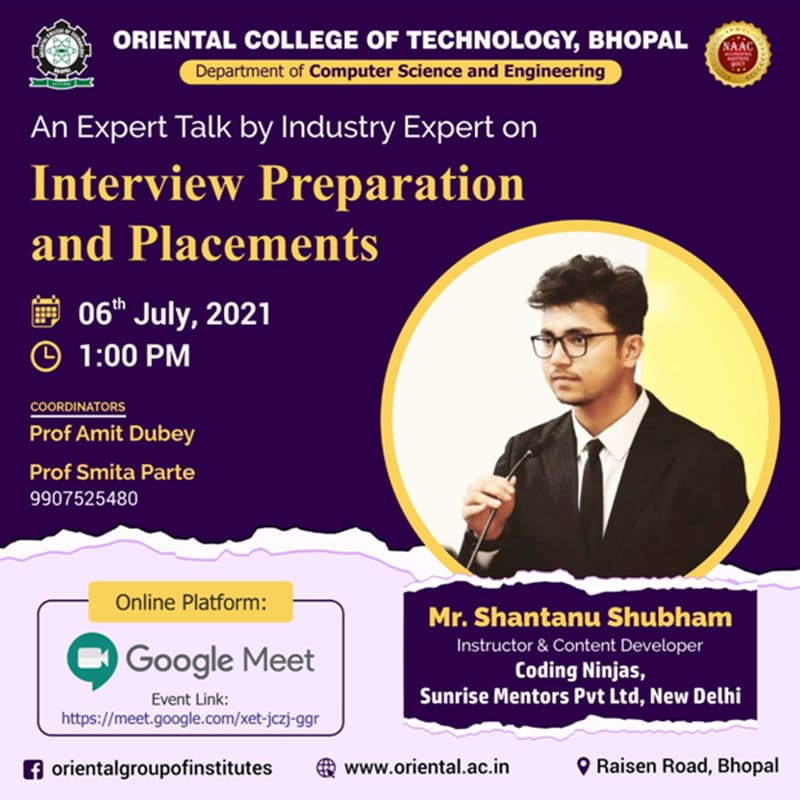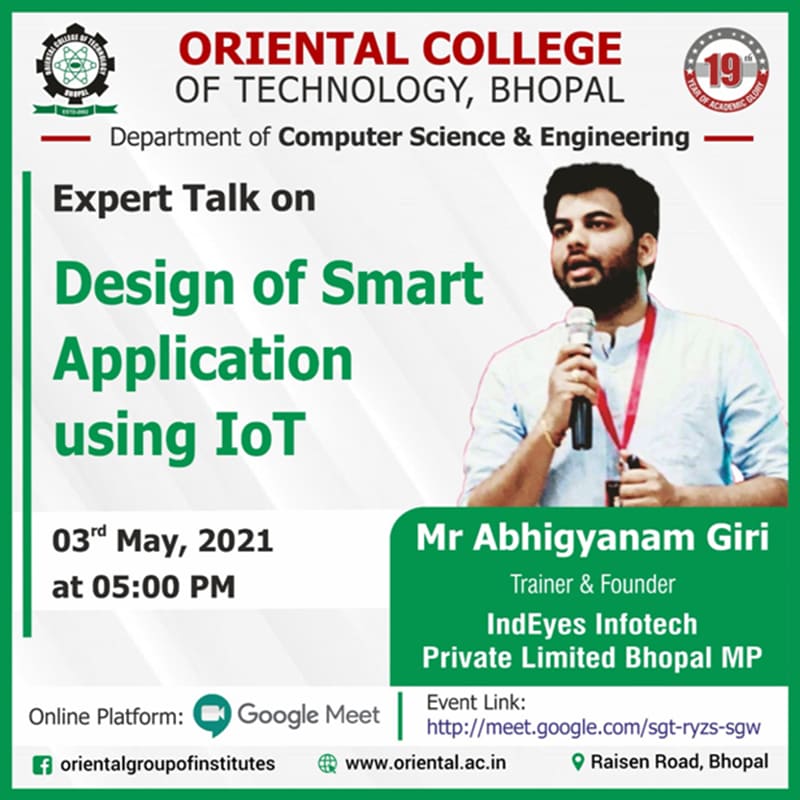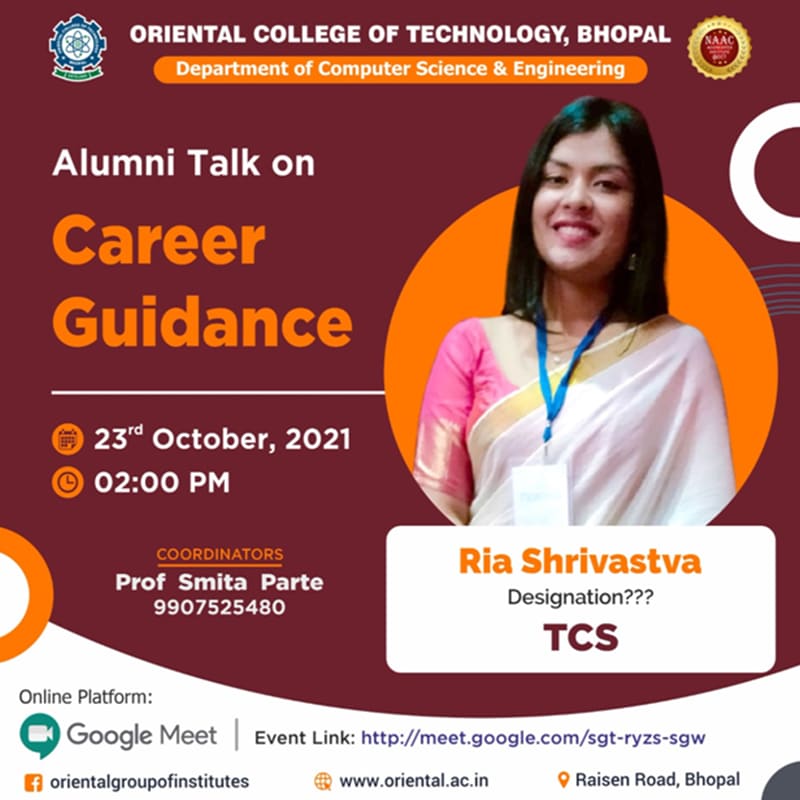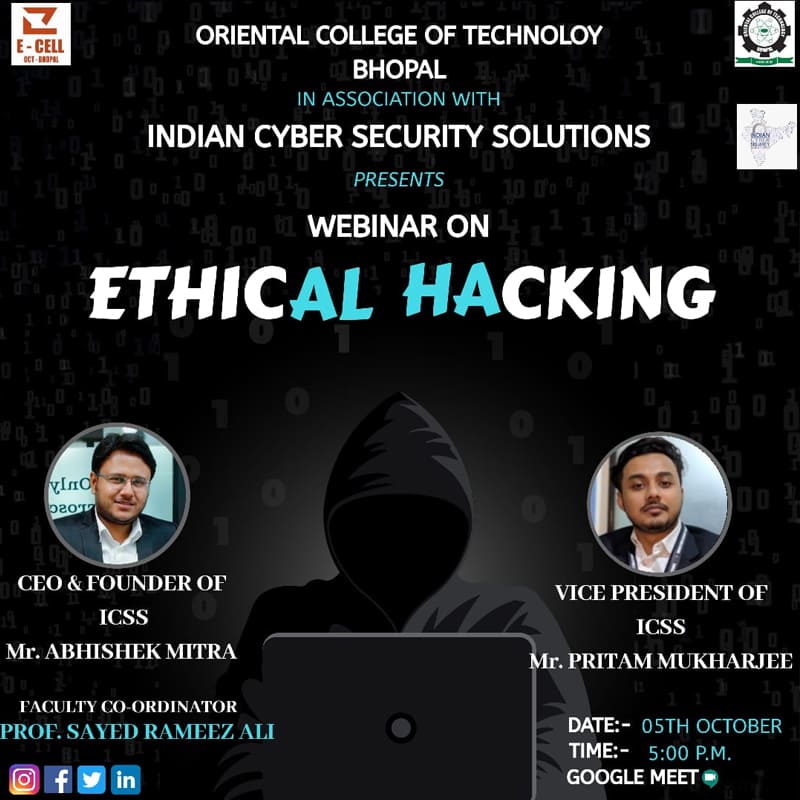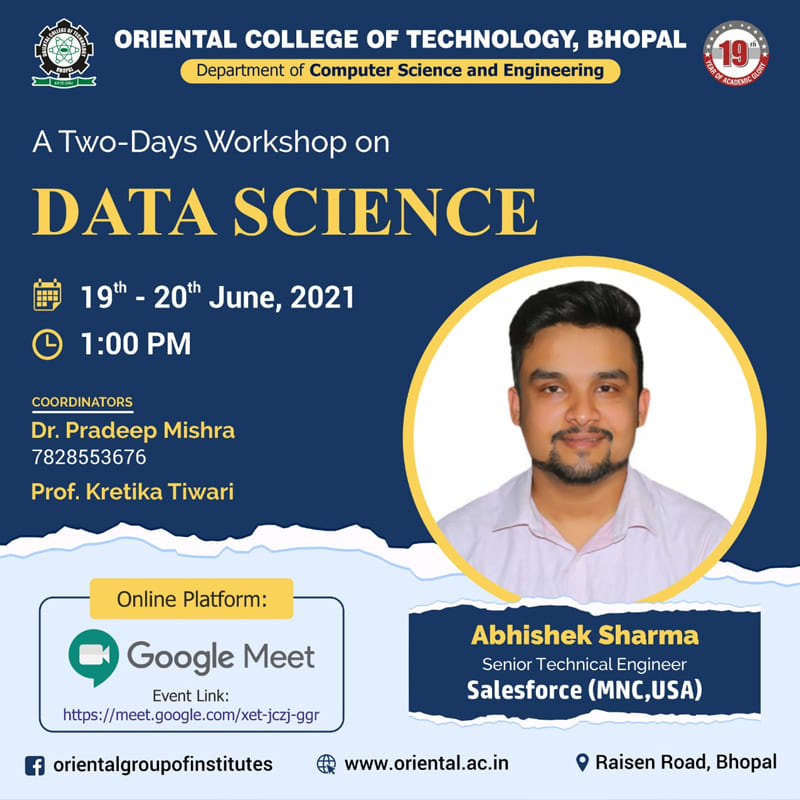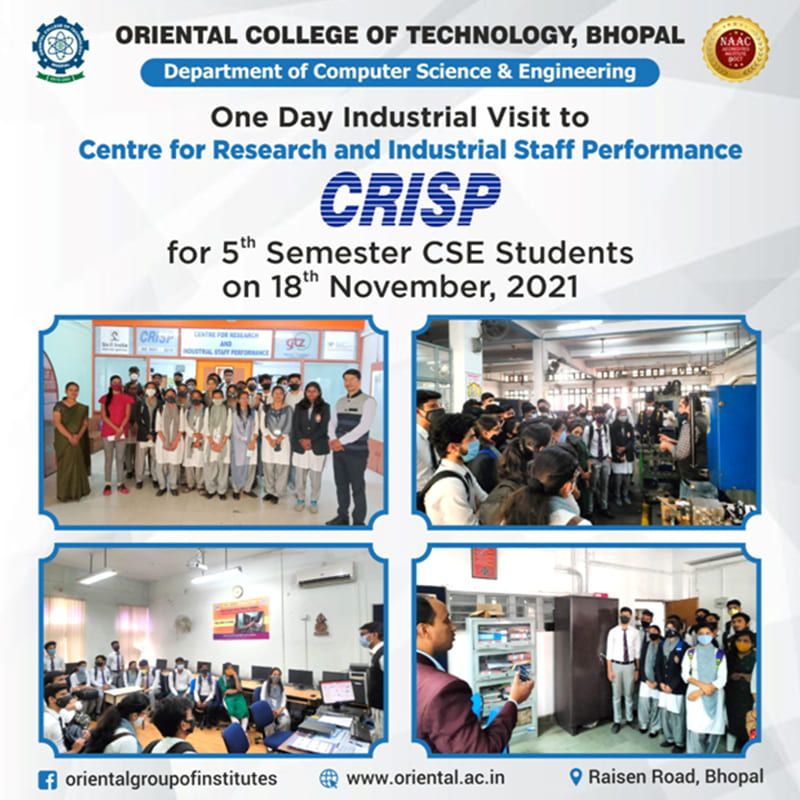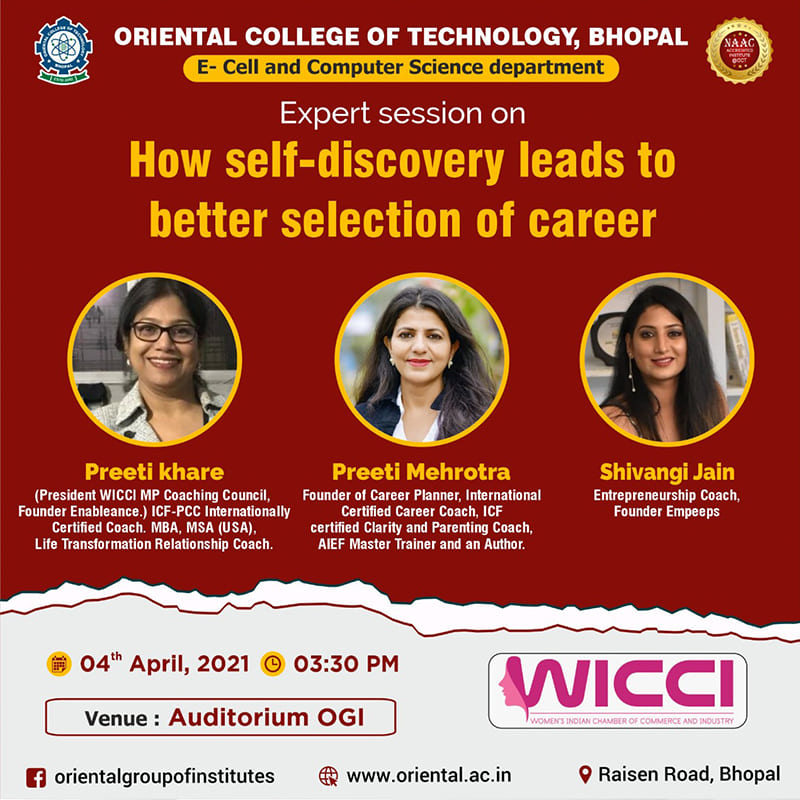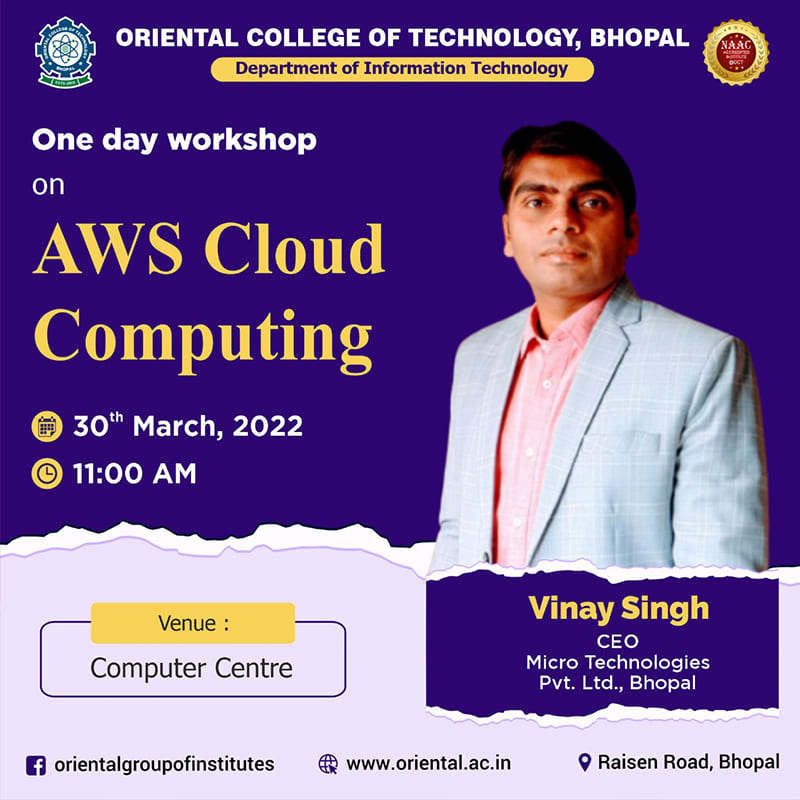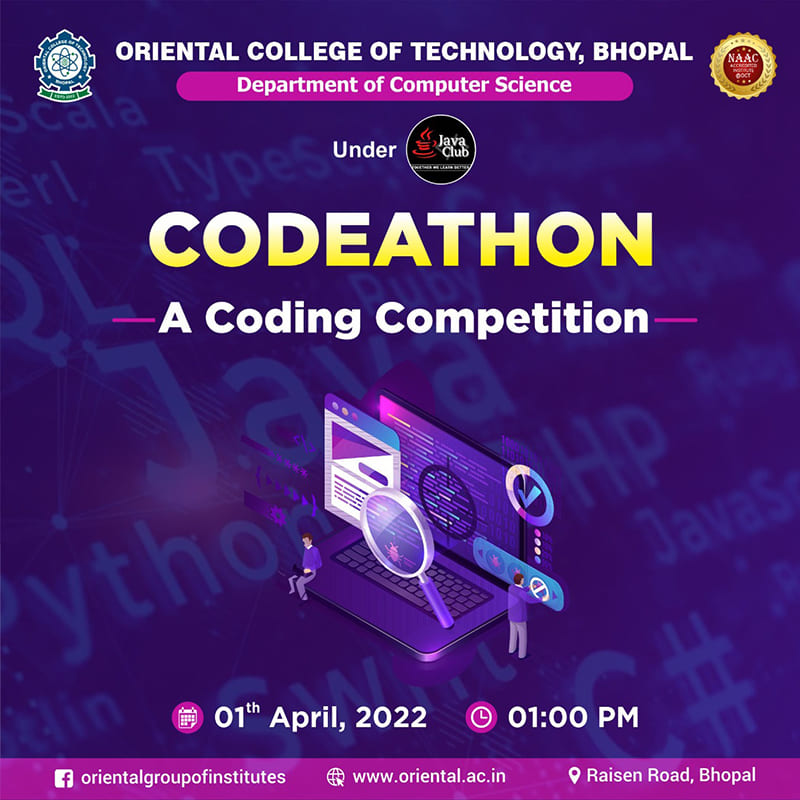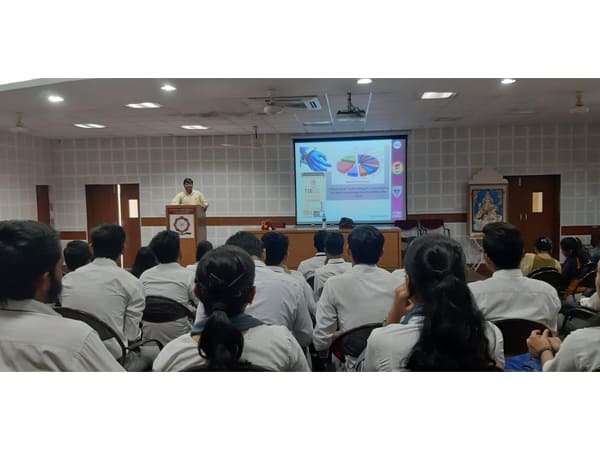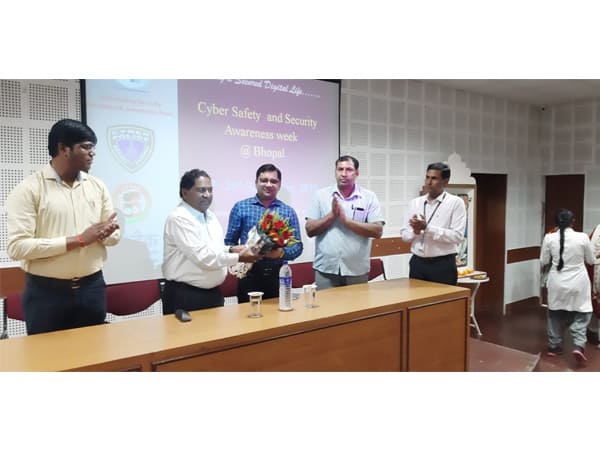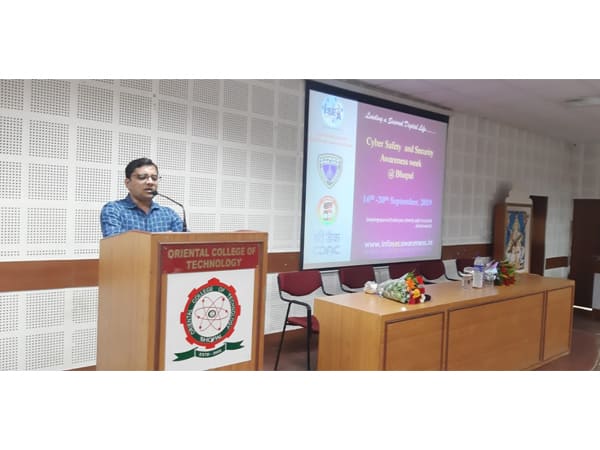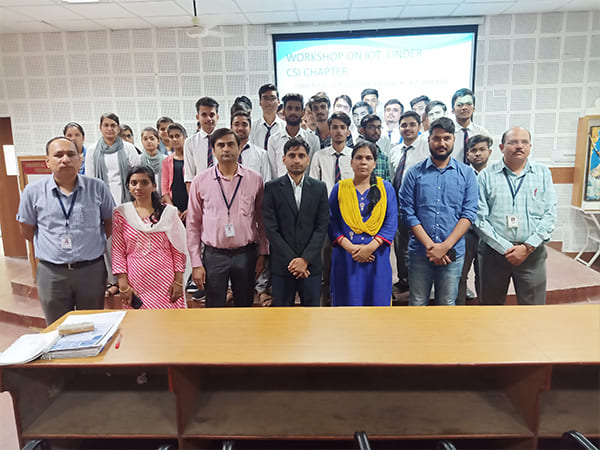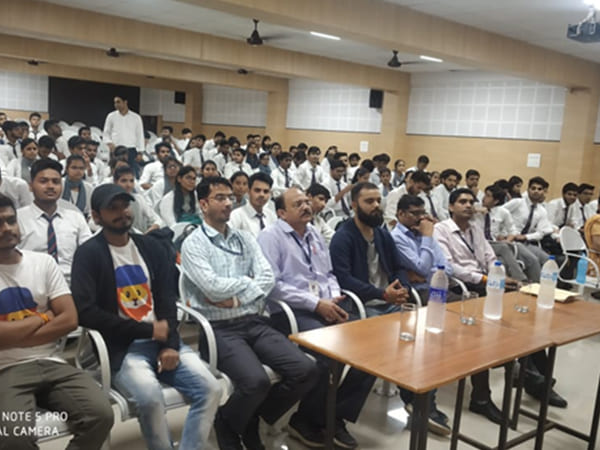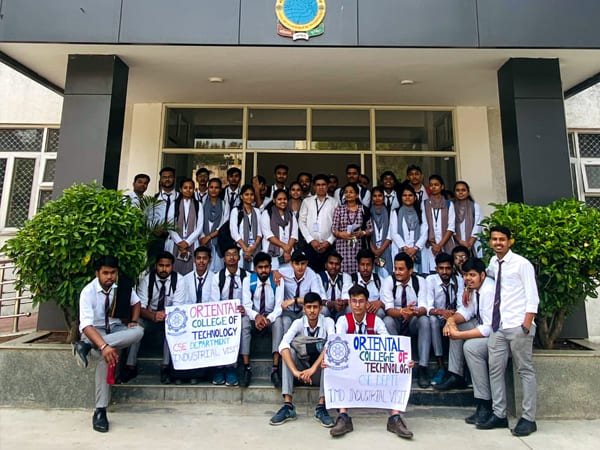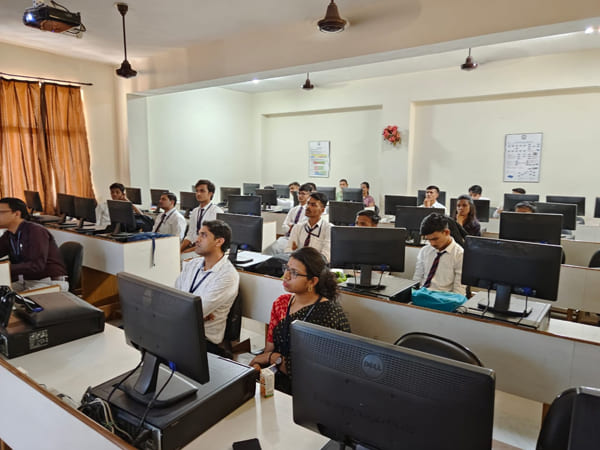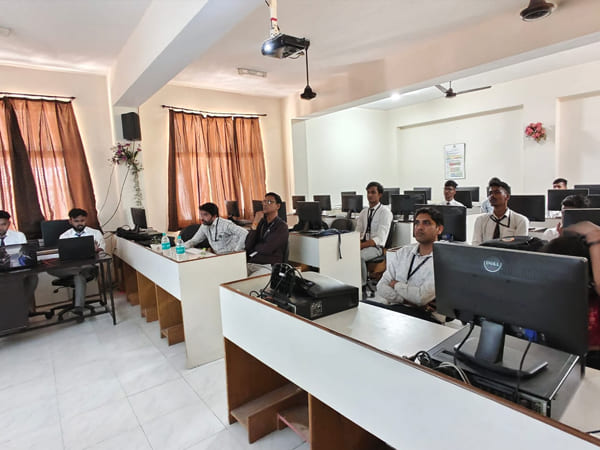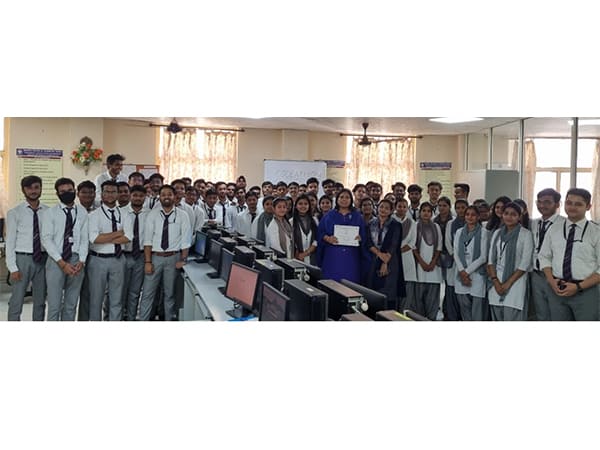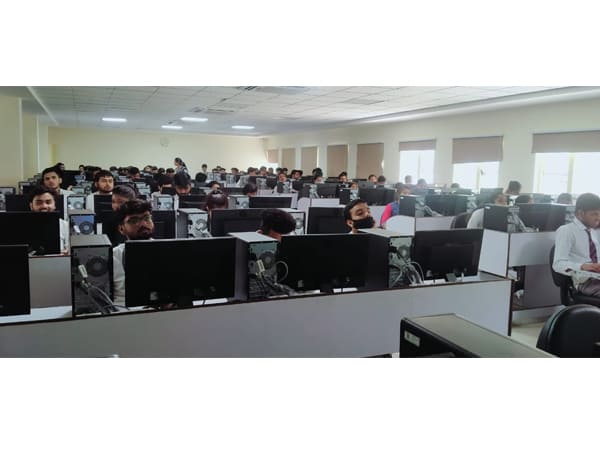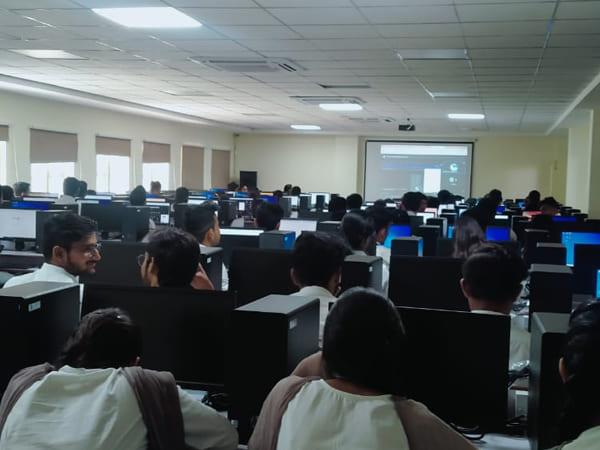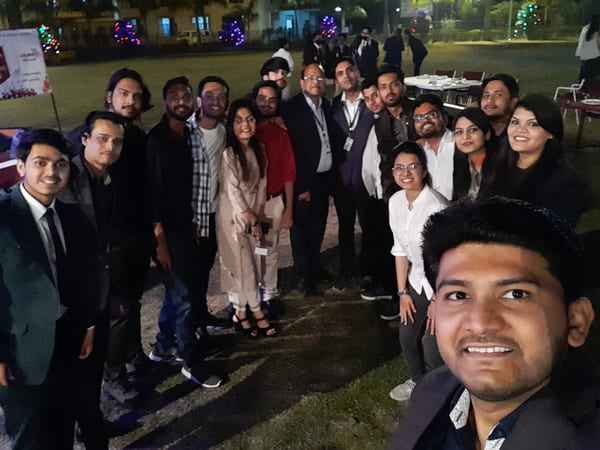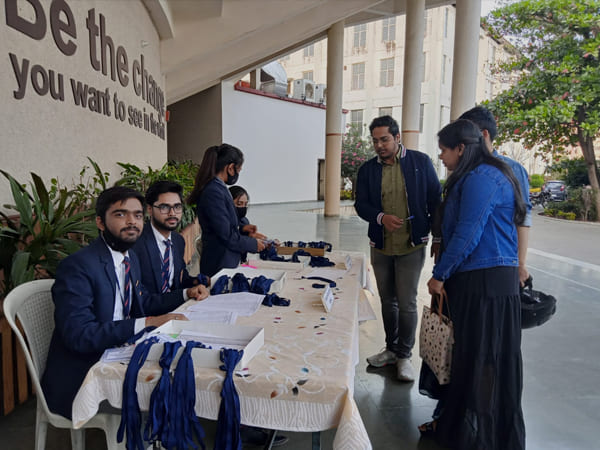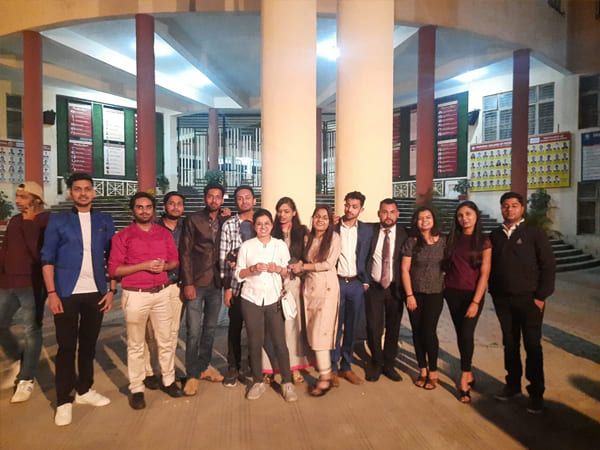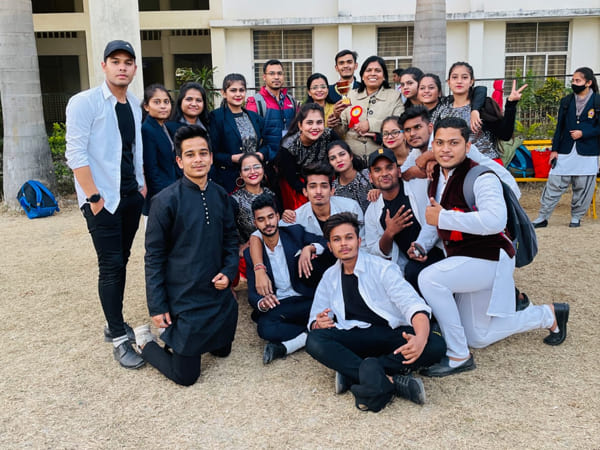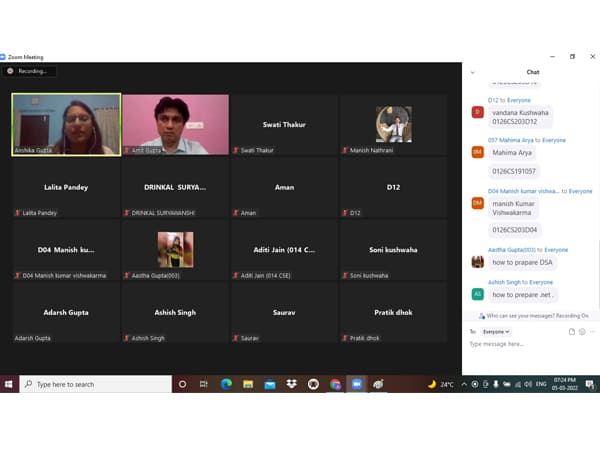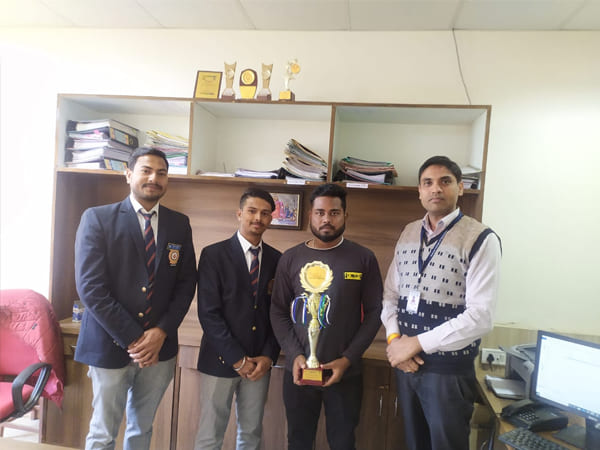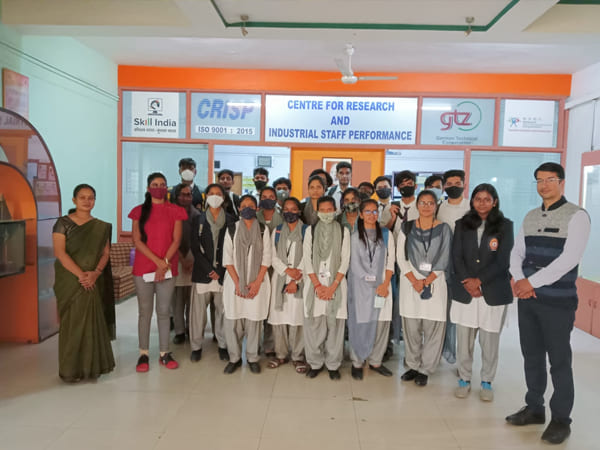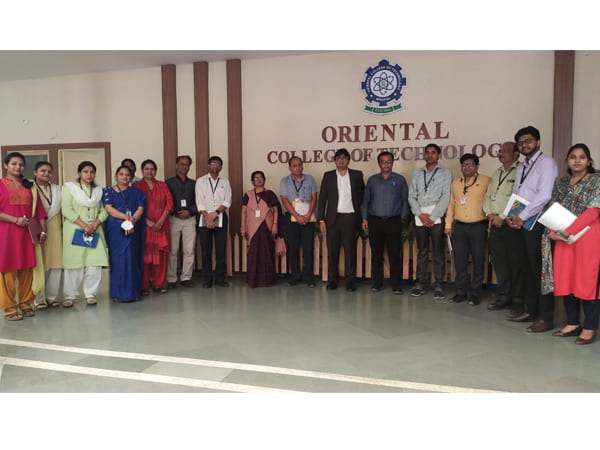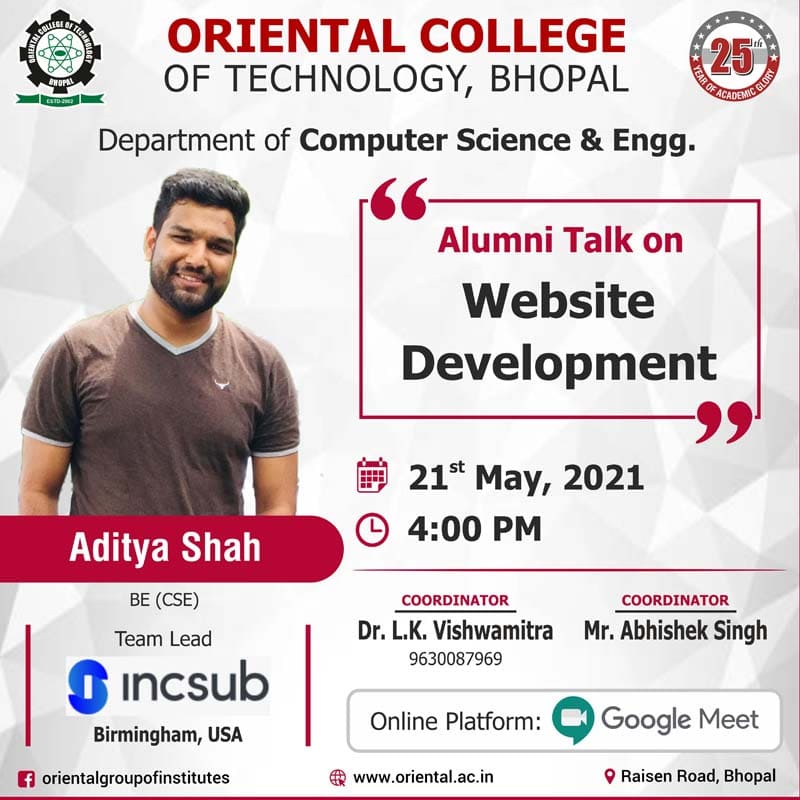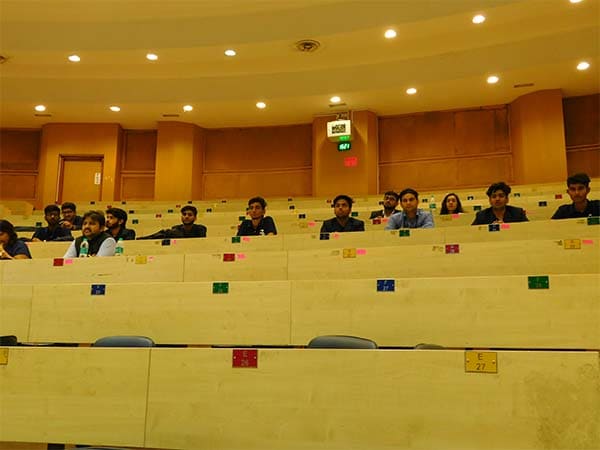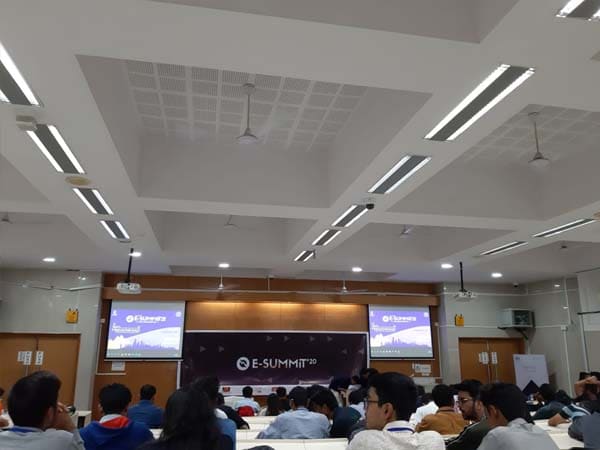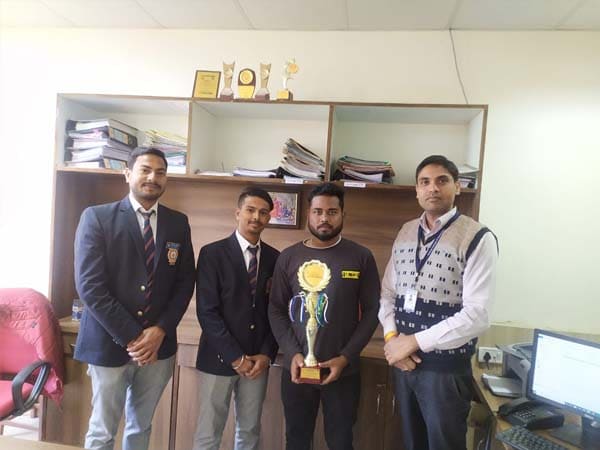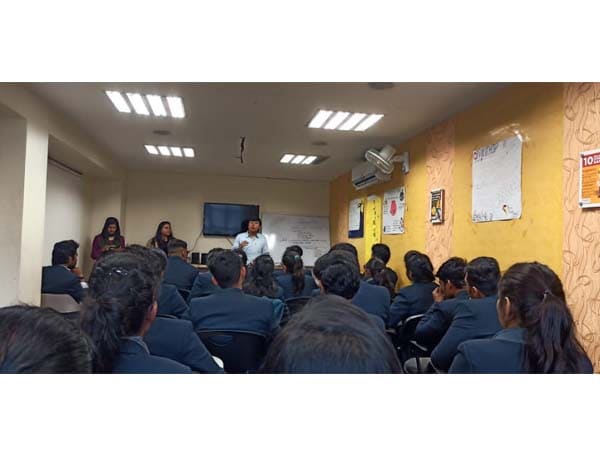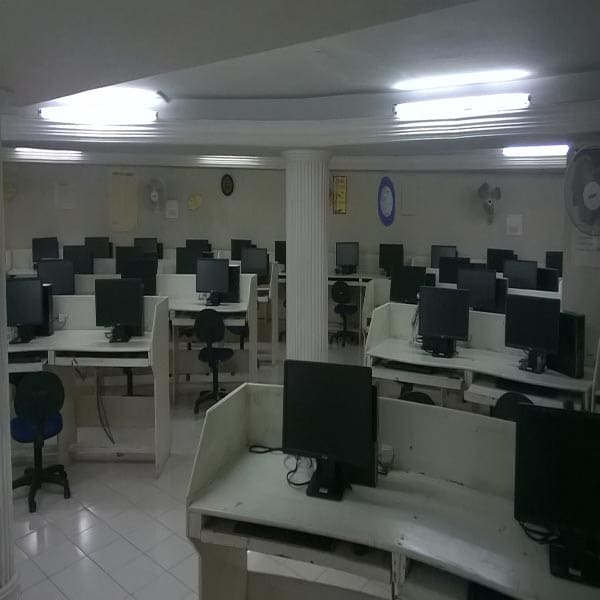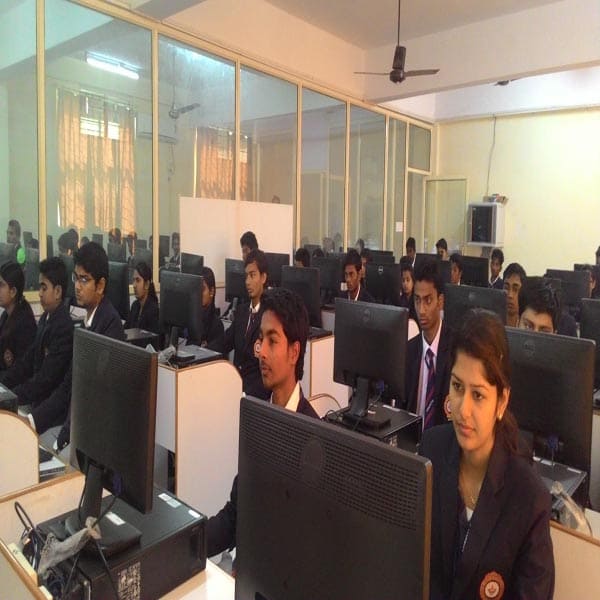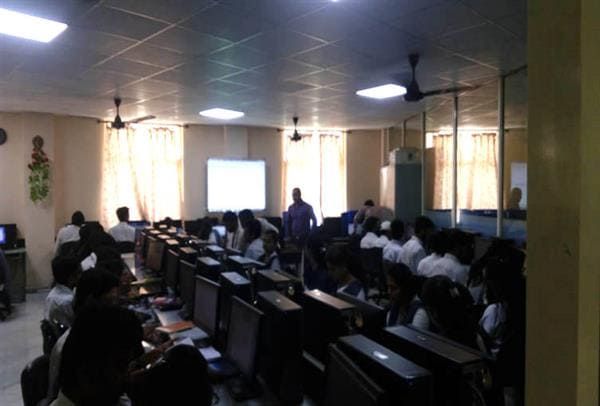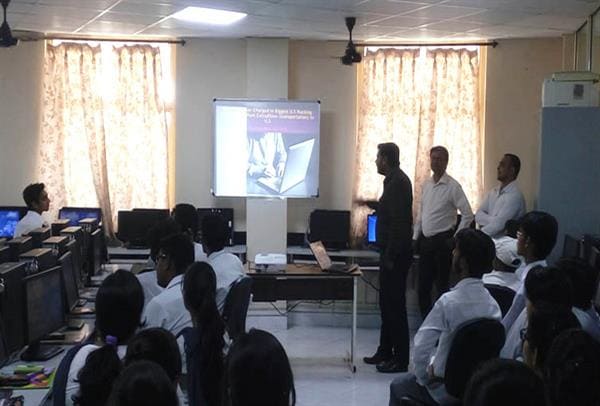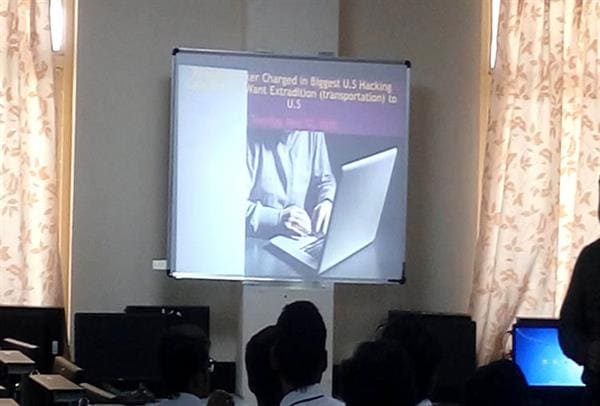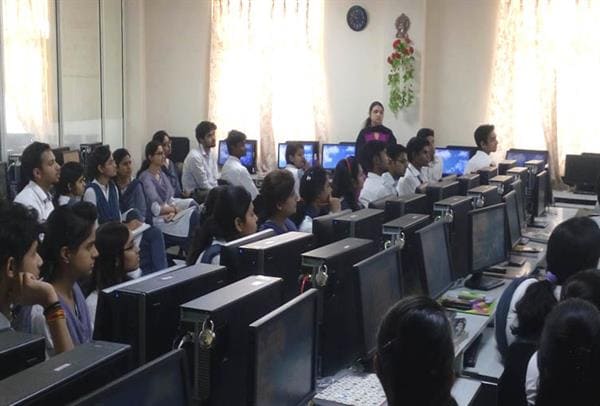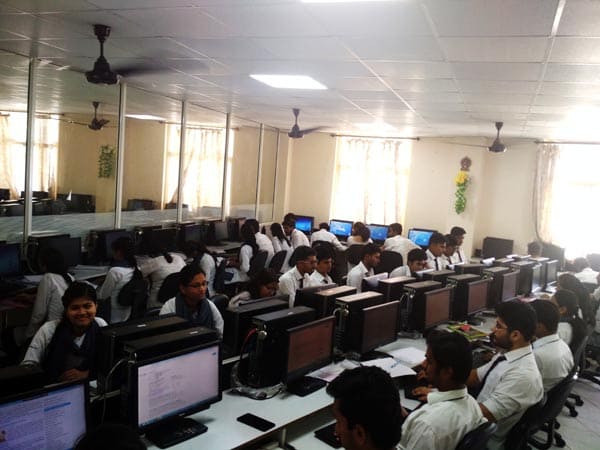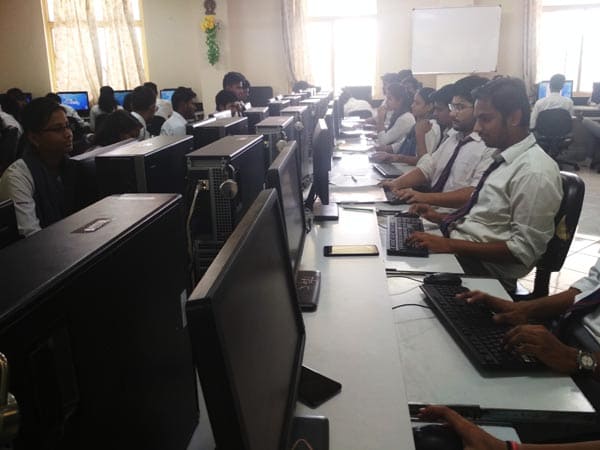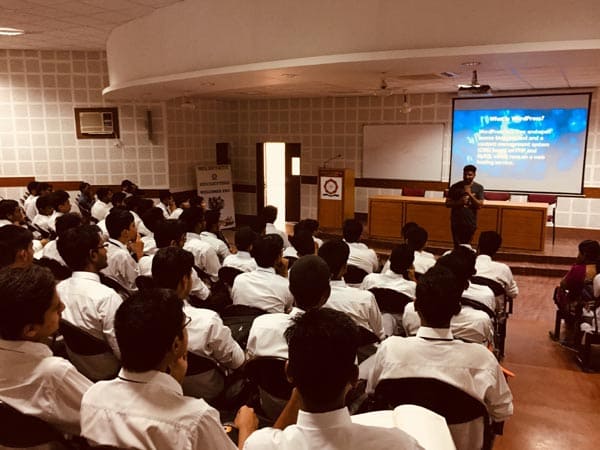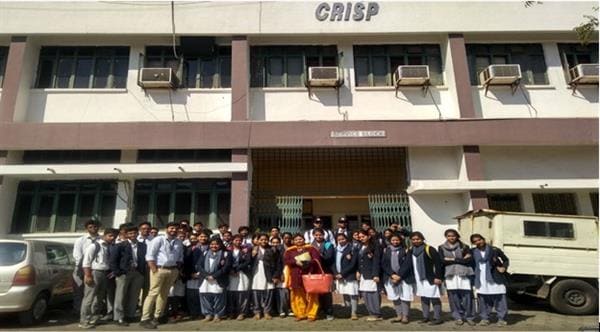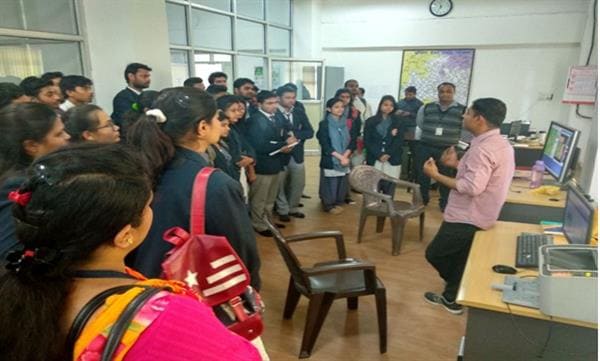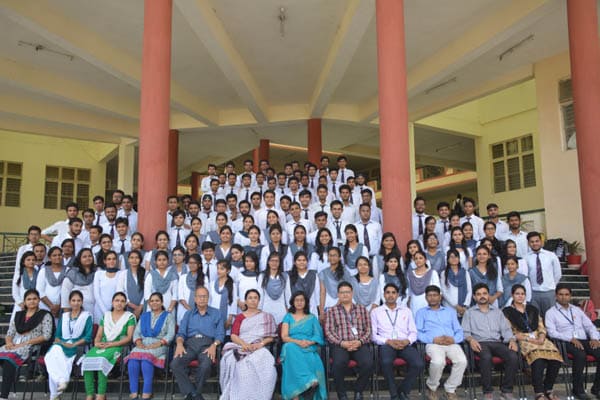About Us
Computer Science and Engineering Department was established in the year 2002. The department has been consistently providing quality academic outcomes. As a result several graduates are working in reputed MNC's across the globe. Bright students from all the parts of the country for quality education in Computer Science and Engineering at under graduate and post graduate levels.
The Department has state-of-the-art infrastructure and computing facilities supported by high speed Ethernet. Various active student chapters such as Association for Computing Machinery (ACM) student chapter, Computer Society of India (CSI) student chapter, various student clubs and NPTEL Local Chapter complement its performance. The students are being encouraged to learn latest technologies as well as several seminars and workshops are being conducted for the same.
The department has highly qualified and competent faculty members, and facilities to support teaching and learning activities. Our faculty members aim at delivering top class education by blending their rich research experience with classroom teaching. The teaching-learning process comprises of class-room teaching, along with tutorials, practical’s, seminars, minor/major projects, group discussion, expert lectures, industrial visits, industrial training and workshops.
B.Tech
Most engineering programs start with general courses in Sciences, and then migrate to specialized courses for the disciplines. With this approach, the B.Tech (CSE) program can be divided broadly in two halves.
- The first half focuses on building the foundations, and is highly structured.
- The second part is for developing the skills and knowledge of the students in various topics – computing and application domains.
- This part also provides limited specializations, and different students may follow different paths and take different set of courses in it.
- Our objective is to produce quality Engineering graduates by imparting top-notch education in the field of Computer Science and to lead them in a successful career industries or entrepreneurial endeavours.
| Course Mode :
Full Time |
Course Duration :
4 Years |
Seats :
180 |
Entrance Exam :
JEE Main exam |
Eligibility :
|
|||
M.Tech
A post-graduate degree, M. Tech. in Computer Science and Engineering is a must if you aspire to set yourself apart from the anonymous mass of "computer professionals" and to assume a leading role in transforming the industry, be it through research, advanced development, teaching, or entrepreneurship.
The main outcomes of the M Tech (CSE) program is to improve the following attributes in students:-
- An ability to undertake original research at the cutting edge of computer science & its related areas.
- An ability to design, develop and evaluate new computer based systems for novel applications which meet the desired needs of industry and society
- An understanding of professional and ethical responsibility
In the long run, our role in the world of computing will be defined not by the export of inexpensive commodity services, but by the quality of intellectual property that we produce and own through core technology development.
| Course Mode :
Full Time |
Course Duration :
2 Years |
Seats :
24 |
Entrance Exam :
Not Applicable |
|
Eligibility :
|
|||
Our Vision
The department commits to adopt latest development in technology and industry to make undergraduates employable and excel in the field of research and entrepreneurship.
Our Mission
- M1: Create awareness of latest knowledge and technology amongst undergraduates for their professional growth
- M2: Develop the art of logical thinking to solve complex industrial problems related to Computer Science and Engineering resulting in research and innovation.
- M3: Seek cooperation of industry to make undergraduates aware of industrial work culture and its environment.
Program Educational Objectives (PEOs)
- Able to apply concepts of mathematics, science, hardware and software aspects of computing to Computer Science and Engineering
- Able to design and develop interdisciplinary and innovative hardware and software solutions.
- Able to inculcate effective communication skills, team work, ethics, leadership in preparation for a successful career in government, academia, industry and R&D organizations.
Program Specific Outcomes
Graduate will be able to:
- Develop skills to analyze problems, design algorithms and implement those using recent computer languages.
- Impart skill to describe web intelligence, cloud computing, cyber security, machine learning, data science & analytics in order to design systems.
Department Facilities
| Laboratories Facilities | |
|---|---|
| Project Lab 01 | Project Lab 02 |
| Data Structure Lab | Database Lab |
| Object Oriented Programming Lab | Python/Java Lab |
| Virtual Lab | Linux Lab |
| Software Facilities | |
|---|---|
| MS Office | Java |
| Python | RStudio |
| C/C++ | NS2 |
| Packet Traces | Ubuntu Linux OS |
| MongoDB | MY SQL |
| Visual Studio | Android Studio |
| Github | PHP |
| Anaconda3 | Apache NetBeans |
| GNUPLOT | Scilab |
| WAMP Server | Eclipse IDE |
| CodeBlock | JOOMLA |
| Node.js | Firewall-Sophos |
| GCC | Acrobat Reader 11 |
| Star UML | |
Other Facilities
- Seminar Hall: A dedicated Seminar Hall with a capacity for 120 people and is equipped with Audio/ Video/ Internet facilities/ACs and Projection.
- Departmental Library: A dedicated departmental library with more than 250 volumes and access to International Journals and Periodicals for students and Staff.
- LCD Projectors: for presentations in labs and classrooms.
- NPTEL videos: - series of audio visual CD are available for various subjects delivered by NPTEL.
- Well-furnished classrooms & tutorial rooms.
Student Achievement
Toppers 2022-23
| S.N | Name of Students | Roll No. | Semester | SGPA |
|---|---|---|---|---|
| 1 | PRERNA RATHORE | 0126CS191080 | VIII | 9.44 |
| 2 | KHUSHI ASWANI | 0126CS191046 | VIII | 9.06 |
| 3 | SHOURYA SETH | 0126CS191104 | VIII | 9.06 |
| 4 | RITIKA MAKHIJA | 0126CS191091 | VIII | 9.06 |
| 5 | PUSHPRAJ SINGH PAWAR | 0126CS191085 | VIII | 9.06 |
| S.N | Name of Students | Roll No. | Semester | SGPA |
|---|---|---|---|---|
| 1 | KHUSHI GITE | 0126CS191048 | VI | 8.96 |
| 2 | ANSHIKA PRASAD | 0126CS191023 | VI | 8.79 |
| 3 | DRINKAL SURYAWANSHI | 0126CS191037 | VI | 8.71 |
| 4 | KHUSHI ASWANI | 0126CS191046 | VI | 8.67 |
| 5 | KHUSHI GARG | 0126CS191047 | VI | 8.67 |
Certifications 2022-23
| S.N | Name of Students | Roll No. | Semester | Course Name |
|---|---|---|---|---|
| 1 | Muskan Ganwani | 0126cs201067 | VII | Coursera |
| 2 | Suveer Raj Rahangdale | 0126cs201113 | VII | Coursera |
| 3 | Gaurav singh | 0126CS201045 | VII | Coursera |
| 4 | Aman bisen | 0126CS201017 | VII | Coursera |
| 5 | Pallavi Bhardwaj | 0126cs201073 | VII | Coursera |
| 6 | Murshid Rizwan | 0126CS201061 | VII | Coursera |
| 7 | Raunak sharma | 0126CS201086 | VII | Coursera |
| 8 | Gaurav Sahu | 0126CS201044 | VII | Coursera |
| 9 | Somil Namdev | 0126CS201109 | VII | Coursera |
| 10 | Rajan Kumar | 0126CS201083 | VII | Coursera |
| 11 | akanksha kumari | 0126CS213D01 | VII | Coursera |
| 12 | Anand Patel | 0126CS201019 | VII | Coursera |
| 13 | Gaurav Sahu | 0126CS201044 | VII | Coursera |
| 14 | Shivam Kumar | 0126CS213D07 | VII | Coursera |
| 15 | Shivam Kumar | 0126CS213D07 | VII | Coursera |
| 16 | Muskan Kushwah | 0126CS201068 | VII | Coursera |
| 17 | Shubh Gupta | 0126CS201106 | VII | Coursera |
| 18 | Nihal Yaduwanshi | 0126CS201071 | VII | Coursera |
| 19 | Saurabh Singh | 0126CS201098 | VII | Coursera |
| 20 | Ritesh kumar jha | 0126CS201088 | VII | Coursera |
| 21 | Sahil Singh Parihar | 0126CS201093 | VII | Coursera |
| 22 | Yash Barapatre | 0126CS201128 | VII | Coursera |
| 23 | shubham shukla | 0126cs201107 | VII | Coursera |
| 24 | shubham shukla | 0126cs201107 | VII | Coursera |
| 25 | Ajay Kumar | 0126CS201013 | VII | Coursera |
| 26 | Prakash Kumar | 0126CS201078 | VII | Coursera |
| 27 | Alzeb Khan | 0126CS201015 | VII | Coursera |
| 28 | Mohd Ayaz Ansari | 0126CS201063 | VII | Coursera |
| 29 | Mohan kumar | 0126cs201062 | VII | Coursera |
| 30 | Anand Patel | 0126CS201019 | VII | Coursera |
| 31 | Shreeja joshi | 0126CS201104 | VII | Coursera |
| 32 | ABHISHEK MAHAJAN | 0126CS201007 | VII | Coursera |
| 33 | Muskan Ganwani | 0126cs201067 | VII | Coursera |
| 34 | Muskan Ganwani | 0126cs201067 | VII | Coursera |
| 35 | Shubh Gupta | 0126CS201106 | VII | Coursera |
| 36 | Somil Namdev | 0126CS201109 | VII | Coursera |
| 37 | poonam mishra | 0126cs201077 | VII | Coursera |
| 38 | Sudhanshu Ranjan | 0126CS201111 | VII | Coursera |
| 39 | Shruti Gayakwad | 0126CS201105 | VII | Coursera |
| 40 | Urvashi Thakur | 0126CS201116 | VII | Coursera |
| 41 | Abhishek Tiwari | 0126CS201009 | VII | Coursera |
| 42 | Kanchan Parashar | 0126CS201050 | VII | Coursera |
| 43 | Aditi Sharma | 0126CS201010 | VII | Coursera |
| 44 | Om Bhushan | 0126CS201072 | VII | Coursera |
| 45 | Om Bhushan | 0126CS201072 | VII | Coursera |
| 46 | Nihal Yaduwanshi | 0126CS201071 | VII | Coursera |
| 47 | Nihal Yaduwanshi | 0126CS201071 | VII | Coursera |
| 48 | Rajni kachhap | 0126CS213D06 | VII | Coursera |
| 49 | Rajni kachhap | 0126CS213D06 | VII | Coursera |
| 50 | Gaurav Sahu | 0126CS201044 | VII | Coursera |
| 51 | Amaan Khan | 0126CS201016 | VII | Coursera |
| 52 | Khushi mandal | 0126CS201052 | VII | Coursera |
| 53 | Anmol Rinayat | 0126CS201022 | VII | Coursera |
| 54 | Khushi mandal | 0126CS201052 | VII | Coursera |
| 55 | Md Mahtab Raja | 0126CS201060 | VII | Coursera |
| 56 | Muskan Yadav | 0126CS201069 | VII | Coursera |
| 57 | chirag shukla | 0126CS201040 | VII | Coursera |
| 58 | chirag shukla | 0126CS201040 | VII | Coursera |
| 59 | Muskan Chaturvedi | 0126CS201066 | VII | Coursera |
| 60 | anuradha patel | 0126CS213D02 | VII | Coursera |
| 61 | Muskan Ganwani | 0126cs201067 | VII | Coursera |
| 62 | Arya Taloker | 0126CS201027 | VII | Coursera |
| 63 | Rudransh sharma | 0126CS201092 | VII | Coursera |
| 64 | Rudransh sharma | 0126CS201092 | VII | Coursera |
| 65 | Hiteaishi Bawankar | 0126CS201049 | VII | Coursera |
| 66 | Muskan Yadav | 0126CS201069 | VII | Coursera |
| 67 | Ritesh kumar jha | 0126CS201088 | VII | Coursera |
| 68 | ROHAN DEO VAISHNAV | 0126CS201090 | VII | Coursera |
| 69 | Priyanshu dwivedi | 0126cs201081 | VII | Coursera |
| 70 | Priyanshu dwivedi | 0126cs201081 | VII | Coursera |
| 71 | Shivanshu Tiwari | 0126CS201103 | VII | Coursera |
| 72 | Shivanshu TIwari | 0126CS201103 | VII | Coursera |
| 73 | Khushi Khare | 0126CS201051 | VII | Coursera |
| 74 | koustubh dubey | 0126CS201055 | VII | Coursera |
| 75 | VAISHNAVI TALE | 0126CS201117 | VII | Coursera |
| 76 | Rocky kumar | 0126CS201089 | VII | Coursera |
| 77 | Rocky kumar | 0126CS201089 | VII | Coursera |
| 78 | vishakha pathak | 0126CS201126 | VII | Coursera |
| 79 | Harshit Shrivastava | 0126cs201048 | VII | Coursera |
| 80 | Abhishek Gour | 0126CS201006 | VII | Coursera |
| 81 | Harshit Shrivastava | 0126cs201048 | VII | Coursera |
| 82 | Dhiraj Kumar | 0126CS201041 | VII | Coursera |
| 83 | Dhiraj Kumar | 0126CS201041 | VII | Coursera |
| 84 | Alzeb Khan | 0126CS201015 | VII | Coursera |
| 85 | Abhishek Pandey | 0126CS201008 | VII | Coursera |
| 86 | Gajendra Singh | 0126CS201043 | VII | Coursera |
| 87 | Gajendra Singh | 0126CS201043 | VII | Coursera |
| 88 | Anurag Agrawal | 0126CS201024 | VII | Coursera |
| 89 | Prakash Kumar | 0126CS201078 | VII | Coursera |
| 90 | Rinky Verma | 0126CS201087 | VII | Coursera |
| 91 | Rinky Verma | 0126CS201087 | VII | Coursera |
| 92 | sonam patidar | 0126cs201110 | VII | Coursera |
| 93 | sonam patidar | 0126cs201110 | VII | Coursera |
| 94 | Anubhav shivhare | 0126CS201023 | VII | Coursera |
| 95 | shreeja joshi | 0126CS201104 | VII | Coursera |
| 96 | Kanchan Parashar | 0126CS201050 | VII | Coursera |
| 97 | Abhishek Mahajan | 0126CS201007 | VII | Coursera |
| 98 | Kanchan Parashar | 0126CS201050 | VII | Coursera |
| 99 | Saurabh Mishra | 0126CS201097 | VII | Coursera |
| 100 | Saurabh Mishra | 0126CS201097 | VII | Coursera |
| 101 | Pallavi Rajput | 0126CS201074 | VII | Coursera |
| 102 | Pallavi Rajput | 0126CS201074 | VII | Coursera |
| 103 | Abhimanyu Srivastava | 0126CS201004 | VII | Coursera |
| 104 | Bhagwan Singh Mehar | 0126CS201036 | VII | Coursera |
| 105 | Abhishek Gour | 0126CS201006 | VII | Coursera |
| 106 | Navin patel | 0126CS201070 | VII | Coursera |
| 107 | Navin patel | 0126CS201070 | VII | Coursera |
| 108 | Bhagwan Singh Mehar | 0126CS201036 | VII | Coursera |
| 109 | Vinayak Agarwal | 0126CS201124 | VII | Coursera |
| 110 | Vinayak Agarwal | 0126CS201124 | VII | Coursera |
| 111 | Abhishek Tiwari | 0126CS201009 | VII | Coursera |
| 112 | Aanchal Thantrahatay | 0126cs201001 | VII | Coursera |
| 113 | Abhishek Tiwari | 0126CS201009 | VII | Coursera |
| 114 | Aanchal Thantrahatay | 0126cs201001 | VII | Coursera |
| 115 | Mohd Saif Ali | 0126CS201064 | VII | Coursera |
| 116 | vaishnavi Tale | 0126CS201117 | VII | Coursera |
| 117 | Khushi Tiwari | 0126CS201053 | VII | Coursera |
| 118 | Khushi Tiwari | 0126CS201053 | VII | Coursera |
| 119 | Kishlay Kumar | 0126CS201054 | VII | Coursera |
| 120 | AJAY KUMAR | 0126CS201013 | VII | Coursera |
| 121 | PRATYUSH SACHAN | 0126CS201080 | VII | Coursera |
| 122 | PRATYUSH SACHAN | 0126CS201080 | VII | Coursera |
| 123 | Harshit Gour | 0126cs201047 | VII | Coursera |
| 124 | Harshit Gour | 0126cs201047 | VII | Coursera |
| 125 | Madhur Raverkar | 0126CS201057 | VII | Coursera |
| 126 | Madhur Raverkar | 0126CS201057 | VII | Coursera |
| 127 | Mansi singh | 0126CS201058 | VII | Coursera |
| 128 | Mansi Singh | 0126CS201058 | VII | Coursera |
| 129 | Aditya Sharma | 0126CS201012 | VII | Coursera |
| 130 | Vikas dhakad | 0126CS201122 | VII | Coursera |
| 131 | Sanjana Changwal | 0126CS201095 | VII | Coursera |
| 132 | vikas dhakad | 0126CS201122 | VII | Coursera |
| 133 | Chandan gour | 1026CS201039 | VII | Coursera |
| 134 | Avinash Kumar Singh | 0126CS201034 | VII | Coursera |
| 135 | ABHISHEK MAHAJAN | 0126CS201007 | VII | Coursera |
| 136 | Vicky Kumar | 0126CS201121 | VII | Coursera |
| 137 | Ashwini Kumar Gupta | 0126cs201032 | VII | Coursera |
| 138 | Ashwini Kumar Gupta | 0126cs201032 | VII | Coursera |
| 139 | Vicky Kumar | 0126CS201121 | VII | Coursera |
| 140 | Bharat Barapatre | 0126CS201038 | VII | Coursera |
| 141 | Avani Jain | 0126CS201033 | VII | Coursera |
| 142 | Khushi Khare | 0126CS201051 | VII | Coursera |
| 143 | Hiteaishi Bawankar | 0126CS201049 | VII | Coursera |
| 144 | Avani Jain | 0126CS201033 | VII | Coursera |
| 145 | Ayush Tripathi | 0126CS201035 | VII | Coursera |
| 146 | sonam patidar | 0126CS201110 | VII | Coursera |
| 147 | Ashok | 0126CS201030 | VII | Coursera |
| 148 | Ashish kumar | 0126CS201029 | VII | Coursera |
| 149 | Ashish kumar | 0126CS201029 | VII | Coursera |
| 150 | Gaurav Sahu | 0126CS201044 | VII | Coursera |
| 151 | Gaurav Sahu | 0126CS201044 | VII | Coursera |
| 152 | Rohit Bakalwar | 0126CS201091 | VII | Coursera |
| 153 | Rohit Bakalwar | 0126CS201091 | VII | Coursera |
| 154 | POONAM mishra | 0126cs201077 | VII | Coursera |
| 155 | Shivani Singh | 0126CS201101 | VII | Coursera |
| 156 | Shivani Singh | 0126CS201101 | VII | Coursera |
| 157 | Simnat Ishwar | 0126cs213d08 | VII | Coursera |
| 158 | yash barapatre | 0126cs201128 | VII | Coursera |
| 159 | Md Mahtab Raja | 0126CS201060 | VII | Coursera |
| 160 | Muskan Ganwani | 0126cs201067 | VII | Coursera |
| 161 | Muskan Chaturvedi | 0126CS201066 | VII | Coursera |
| 162 | vishakha pathak | 0126CS201126 | VII | Coursera |
| 163 | Shivam Kumar | 0126CS213D07 | VII | Coursera |
| 164 | Shubh Gupta | 0126CS201106 | VII | Coursera |
| 165 | Shubh Gupta | 0126CS201106 | VII | Coursera |
| 166 | Vivek Kumar singh | 0126CS201127 | VII | Coursera |
| 167 | Rinky Verma | 0126CS201087 | VII | Coursera |
| 168 | ROHAN DEO VAISHNAV | 0126CS201090 | VII | Coursera |
| 169 | Rudransh sharma | 0126CS201092 | VII | Coursera |
| 170 | Muskan Yadav | 0126CS201069 | VII | Coursera |
| 171 | Anubhav shivhare | 0126CS201023 | VII | Coursera |
| 172 | Sudhanshu Ranjan | 0126CS201111 | VII | Coursera |
| 173 | Vivek Kumar Singh | 0126CS201127 | VII | Coursera |
| 174 | Anubhav shivhare | 0126CS201023 | VII | Coursera |
| 175 | Anubhav shivhare | 0126CS201023 | VII | Coursera |
| 176 | Anubhav shivhare | 0126CS201023 | VII | Coursera |
| 177 | Rinky Verma | 0126CS201087 | VII | Coursera |
| 178 | Shruti Gayakwad | 0126CS201105 | VII | Coursera |
| 179 | Sudhanshu Ranjan | 0126CS201111 | VII | Coursera |
| 180 | VIKAS DHAKAD | 0126CS201122 | VII | Coursera |
| 181 | VIKAS DHAKAD | 0126CS201122 | VII | Coursera |
| 182 | Suveer Raj Rahangdale | 0126cs201113 | VII | Coursera |
| 183 | Muskan Ganwani | 0126cs201067 | VII | Coursera |
| 184 | Muskan Ganwani | 0126cs20107 | VII | Coursera |
| 185 | Pratyush Sachan | 0126cs201080 | VII | Coursera |
| 186 | Saurabh Mishra | 0126cs201097 | VII | Coursera |
| 187 | Saurabh Mishra | 0126cs201097 | VII | Coursera |
| 188 | Alzeb Khan | 0126CS201015 | VII | Coursera |
| 189 | Muskan Ganwani | 0126cs201067 | VII | Coursera |
LIST OF TOP 10 STUDENTS BRANCH/SEM :
CSE VII SEM SESSION: JULY-DEC 2019
| S. No. | Enrollment | Name | SGPA |
|---|---|---|---|
| 1 | 0126CS161017 | ANKIT SINGH | 8.69 |
| 2 | 0126CS161014 | AMIT SINGH | 8.63 |
| 3 | 0126CS161081 | RAJEEV RANJAN | 8.56 |
| 4 | 0126CS161044 | JYOTSNA YADUWANSHEE | 8.5 |
| 5 | 0126CS161055 | MONU YADAV | 8.38 |
| 6 | 0126CS161064 | PARUL SHRIVASTAVA | 8.31 |
| 7 | 0126CS161092 | SAMRIDHI AGRAWAL | 8.31 |
| 8 | 0126CS161090 | SAKSHI SINHA | 8.25 |
| 9 | 0126CS161010 | AKSHAY GUPTA | 8.19 |
| 10 | 0126CS161037 | HARSHA GOYAL | 8.19 |
CSE V SEM SESSION: JULY-DEC 2019
| S. No. | Enrollment | Name | SGPA |
|---|---|---|---|
| 1 | 0126CS171014 | ANSHUL PANDEY | 8.71 |
| 2 | 0126CS171037 | HARISHANKER CHAUHAN | 8.63 |
| 3 | 0126CS171092 | SHIVALIKA RAIKWAR | 8.54 |
| 4 | 0126CS171069 | PURSHOTAM KUMAR | 8.46 |
| 5 | 0126CS171063 | PRACHI BOKDE | 8.42 |
| 6 | 0126CS171046 | KRITIK SHIVANSHU | 8.33 |
| 7 | 0126CS171016 | ANTARA | 8.25 |
| 8 | 0126CS171084 | SAMBHAW JAIN | 8.25 |
| 9 | 0126CS171124 | VIPUL AGRAWAL | 8.25 |
| 10 | 0126CS171045 | KHUSBU KUMARI | 8.21 |
CSE III SEM SESSION: JULY-DEC 2019:
| S. No. | Enrollment | Name | SGPA |
|---|---|---|---|
| 1 | 0126CS181065 | MANAS SRIVASTAVA | 9.04 |
| 2 | 0126CS181066 | MANSI PATEL | 9 |
| 3 | 0126CS181096 | SHITAL PARMAR | 9 |
| 4 | 0126CS181075 | PRABHAT BHARADWAJ | 8.67 |
| 5 | 0126CS181031 | ARUSHI BIRLA | 8.63 |
| 6 | 0126CS181089 | ROSHNI | 8.54 |
| 7 | 0126CS181068 | MOHIT AJAY SHRIVASTAVA | 8.46 |
| 8 | 0126CS181086 | RITIKA PUROHIT | 8.46 |
| 9 | 0126CS181019 | AMAN PANDEY | 8.42 |
| 10 | 0126CS181103 | SHRAMAN JAIN | 8.42 |
Students’ achievement in Co Curricular and Extracurricular fields (Cultural/Literary/Sports) outside the Institute.
| S. No. | NAME OF THE STUDENT(SEM) | NAME AND DETAILS OF EXTRACURRICULAR EVENT | ACHIEVEMENT |
|---|---|---|---|
| 1. | Gajnedra Singh Thakur
(CSE VIII sem) |
Cricket | RGPV Nodal
|
| 2. | Jasraj Singh Bingah
(CSE VIII sem) |
Football | RGPV Nodal
|
| 3. | Ankir Gupta
(CSE VIII sem) |
NCC | C Certificate
|
| 4. | Vishwaraj Yadav
(CSE VI sem) |
Badminton | State level
|
| 5. | Ashlesha Dongre
(CSE IV sem) |
Badminton | RGPV Nodal Runnerup
|
Faculty Achievements
Patent
| Sr No. | Name of Faculty | Details | Application No. | Month-Year |
| 1 | Sreeja Nair | An IOT Based System For Maintaining Traffic Signal in Smart Cities Using Machine Learning Model | Application No.: 202321012932 17/03/2023 | 2023 |
| 2 | Dr. Bhagwati Charan Patel | Device For Verification of Analyzed Data | Application No.:375904-001 IPR India, Design Accepted and Published, Journal No is 04/2023 and Journal Date is 21/12/2022 | 2022 |
| 3 | Dr. L.K. Vishwamitra | An Intelligent Shopping Cart For Tracking Product Using IoT | Application No.: 367953-001 Published 19/07/2022 | 2022 |
| 4 | Mrs. Roopali Soni | A computer implemented method for detecting human touch using body mounted camera to minimize Covid Spread Using Machine Learning | Application No.: 2021104849 Australian Government IP Australia 09/06/2022 | 2022 |
| 5 | Mr. Amit Dubey | An Intelligent Shopping Cart For Tracking Product Using IOT | Application No.: 367953-001 Published 19/07/2022 | 2022 |
| 6 | Sreeja Nair | Automated Hydroponics System Using IOT Devices | Application No.: 202221009360 11/03/2022 | 2022 |
| 7 | Priyanka Mishra Sharma | An Intelligent Shopping Cart For Tracking Product Using IOT | Application No.: 367953-001 Published 19/07/2022 | 2022 |
| 8 | Dr. Monika Bhatnagar | Automated Hydroponics System Using IOT Devices | Application No.: 202221009360 11/03/2022 | 2022 |
| 9 | Namrata Choudhary | An Intelligent Shopping Cart For Tracking Product Using IOT | Application No.: 367953-001 Published 19/07/2022 | 2022 |
| 10 | Ruchi Jain | A Machine Learning Model For Intelligent bid price Selection For Profit Accumulation | Application No.: 20222104190 05/08/2022 | 2022 |
| 11 | Amit Gupta | An Intelligent Shopping Cart For Tracking Product Using IOT | Application No.: 367953-001 Published 19/07/2022 | 2022 |
| 12 | Meenakshi Patel | Automated Hydroponics System Using IOT Devices | Application No.: 202221009360 11/03/2022 | 2022 |
| 13 | Sreeja Nair | Autonomous Vehicle Driving and Traffic Sign Identification Based on Deep Learning Model | Application No.: 202121034020 05/11/2021 | 2021 |
| 14 | Mr. Amit Kanskar | Distributed frameworks for health care information exchange using Block chain Technology | Patent number: 2021102488 Australian Government IP Australia 16/06/2021 | 2021 |
| 15 | Ms. Smita Parte | A Smart IOT based air cooler system with Touch Screen Display Unit | Application No.: 202141057895 Indian Patent 17/12/2021 | 2021 |
| 16 | Dr. L.K. Vishwamitra | Pervasive Outdoor Wireless Sensor Networks For Cattle Farming | Application No.: 202011029830A 28/08/2020 | 2020 |
| 17 | Dr. L.K. Vishwamitra | Calorie Counting Jar using IOT | Application No. : 316298-001 01/04/2019 | 2019 |
Books Published
| Sr No. | Name of Faculty | Title | ISBN No. | Published By |
| 1 | Dr. L.K. Vishwamitra | Diabetes Detection using Data Mining Techniques” Publisher | 978-620-5-50851-0 | Lambert Academic Publishing |
| 2 | Dr. L.K. Vishwamitra | Security on Text & Digital Image using Discrete Shear let Transform | 978-620-6-14645-2 | Lambert Academic Publishing |
Paper Published
| S No. | Name of Author | Title/Topic | Name of the Journal | International/National Journal with impact Factor | Year of Publication |
| 1 | Priyanka Saxena | Multi Order Deep Learning Model for Community Detection | CSNT 2023, IEEE 31 May 2023 | 10.1109/CSNT57126.2023.10134648 INSPEC Accession Number: 23202532 | 2023 |
| 2 | Priyanka Saxena | Adaptive Multi-Hop Deep Learning Based Drug Recommendation System with Selective Coverage Mechanism | CSNT 2023, IEEE 31 May 2023 | 10.1109/CSNT57126.2023.10134673 INSPEC Accession Number: 23202545 | 2023 |
| 3 | Prof. Roopali Soni | An Efficient Machine Learning Technique for Android Malware Prediction | International Journal of Recent Development in Engineering and Technology Website: www.ijrdet.com | ISSN 2347-6435(Online) Volume 12, Issue 04, April 2023 | 2023 |
| 4 | Prof. Roopali Soni | Review of Android Malware Prediction using Artificial Intelligence Techniques | International Journal of Recent Development in Engineering and Technology Website: www.ijrdet.com | ISSN 2347-6435(Online) Volume 12, Issue 02, February 2023 | 2023 |
| 5 | Dr. L.K. Vishwamitra | Facial Emotion Detection Based on Spatial Transformer Network Using Deep Learning | Journal of Fundamental & Comparative Research, UGC Care Approved | ISSN:2277-7067 | 2022 |
| 6 | Dr. L.K. Vishwamitra | Data Security In A Cloud Computing Environment: A Novel Approach And Objectives | Journal of Tianjin University Science and Technology | ISSN (Online): 0493-2137 | 2022 |
| 7 | Priyanka Saxena | GCN and Non -Negative Matrix Factorization based Community Detection Mechanism | IDEA 2022, Springer | https://link.springer.com/ | 2022 |
| 8 | Dr. L.K. Vishwamitra | Multi-Level ECDH-Based Authentication Protocol for Secure Software- Defined VANET Interaction Communications | Journal Of Northeastern University | ISSN: 1005-3026 | 2022 |
| 9 | Dr. L.K. Vishwamitra | A Review On User Profiling Using Machine Learning On Content Streaming Platforms | International Journal of Pervasive Computing and Communications | ISSN: 1742-7371 | 2022 |
| 10 | Ms. Smita Parte | Block chain based Hierarchical Semi-Decentralized Approach using IPFS for Secure and Efficient Data Sharing | Journal of King Saud University - Computer and Information Sciences | Volume 34, Issue 4, 2022, pp. 1431-1438 -SCI-Q1 journal | 2022 |
| 11 | Mr. Amit Dubey | Recent Trends In Pattern Recognition With Data Mining Techniques | Oriental Institute | ISSN: 0030-5324 | 2022 |
| 12 | Priyanka Saxena | Self-Attention and Transfer Learning Based Clinical | Recommendation System for Healthcare | IDEA 2022, Springer https://link.springer.com/ | 2022 |
| 13 | Dr. L.K. Vishwamitra | Comparative Analysis of Practice proactive and reactive Routing Protocols in VANET environment | Science Direct | ISSN: 2665-9174 | 2021 |
| 14 | Dr. L.K. Vishwamitra | Data Mining based Prediction of Diabetes using Firefly Optimized Neural Network | IEEE | ISSN: 2329-7182 | 2021 |
| 15 | Dr. L.K. Vishwamitra | Diabetes Detection using Convolutional Neural Network | Trukish Journal of Computer and Mathematics Education (TURCOMAT) | Vol 12 No. 10(2021) Updated: 2021-05-02 Version | 2021 |
| 16 | Dr. FarhaHaneef | Human Brain Signal Based Stress Analysis Using Electroencephalogram Signals. | IJCRT | Volume 9, Issue 8 August 2021 | 2021 |
| 17 | Dr. FarhaHaneef | A Survey on “Machine translation Approaches for Indian Languages”. | Turkish Journal of Computer and Mathematics Education. | Vol.12 No.3(2021) | 2021 |
| 18 | Mr. Amit Gupta | Cluster Formation and Maintenance Techniques for Mobile Adhoc Networks with Improved Quality of Service | International Journal of Emerging Technology and Advanced Engineering | ISSN NO: 0976-6499 | 2021 |
| 19 | Dr.BhagwatiCharan Patel | “IoT an Overview: Advantage,DisadvantageandApplications”. | InternationalJournalof ComputerApplications Technology and Research, | Volume 10–Issue 05, pp. 119-122, 2021, ISSN:-2319–8656, 2021. | 2021 |
| 20 | Dr. BhagwatiCharanPatel | “IoTbased DistributedSecurity System”. | International Journal for Research in Applied Science & EngineeringTechnology(IJRASET), | Volume9IssueIVApr2021,pp.957-963,ISSN:2321-9653,2021. | 2021 |
| 21 | Dr. L.K. Vishwamitra | Hybrid Method for Secured Data Dissemination in Vehicle Ad-Hoc Network | GEDRAG & ORGANISATIE REVIEW | ISSN:0921-5077 VOLUME 33 : ISSUE 03 – 2020 | 2020 |
| 22 | Dr. FarhaHaneef | A Framework for Successful IoT Adoption in Agriculture Sector: A Total Interpretive Structural Modeling Approach. | the Journal for Global Business Advancement | SCOPUS INDEXED JOURNAL, January 2020 | 2020 |
| 23 | Dr. FarhaHaneef | Internet of things and agriculture relationship: a bibliometric analysis. | the Journal for Global Business Advancement | SCOPUS INDEXED JOURNAL January 2020 | 2020 |
| 24 | Dr. FarhaHaneef | A Review on Image Object Segmentation Features onVarious Techniques and Limitations. | International Journal of Scientific Research & Engineering Trends | Volume 6, Issue 5, Sept-Oct-2020 | 2020 |
| 25 | Dr. FarhaHaneef | A Comprehensive Review on Autism Spectrum Disorder in Children using CNN | International Journal of Mechanical and Production Engineering Research and Development (IJMPERD). | Vol. 10, Issue 4, Aug 2020, 465–476, (SCOPUS INDEXED JOURNAL) | 2020 |
| 26 | Ms. Priyanka Sharma | A Survey On Various Types of Task Scheduling | 1513 Scopus Indexed | Volume 9, ISSUE 01, January 2020 | 2020 |
| 27 | Dr. BhagwatiCharan Patel | “Introduction to Sensors”, Advances in Modern Sensors, Physics, Design, Simulation and Applications(Book Chapter) | Ch-1, IOP Publishing Ltd, Bristol, United Kingdom, pp.1-1 to 1-21, Nov. 2020,DOI.10.1088/978-0-7503-2707-7,Online | ISBN:978-0-7503-2707-7 | 2020 |
| 28 | Dr. BhagwatiCharan Patel | “OpticalSensors:Overview,CharacteristicsandApplications”.(Book Chapter) | AdvancesinModernSensors,Physics, Design, Simulation and Applications, IOP PublishingLtd,Bristol,UnitedKingdom | pp.3-1 to 3-27, Nov. 2020, Ch-3, DOI.10.1088/978-0-7503-2707-7 | 2020 |
| 29 | Dr. BhagwatiCharan Patel | “ToolsandRubricsforAssessmentofLearningOutcomes”.(Book Chapter) | AssessmentToolsforMappingLearningOutcomeswithLearningObjectives,AvolumeintheAdvancesinEducationalTechnologies and Instructional Design (AETID) Book Series, IGI Global InformationScienceReference | Ch.13,pp.211-254,25Sept.2020.ISSN:2326-8905,DOI:10.4018/978-1-7998-4784-7.ch013 | 2020 |
| 30 | Dr. BhagwatiCharanPatel | “TraditionalTeachingPedagogy:Studentvs TeacherCentric”. (Book Chapter) | AssessmentToolsforMappingLearningOutcomeswithLearningObjectives,AvolumeintheAdvancesinEducationalTechnologies and Instructional Design (AETID) Book Series, IGI Global InformationScienceReference | Ch.4,pp.42-57,25Sept.2020.ISSN:2326-8905,DOI:10.4018/978-1-7998-4784-7.ch004 | 2020 |
| 31 | Dr. Sanjay Sharma | Hybrid Text Illusion CAPTCHA Dealing with Partial Vision Certainty | International Conference | Springer Nature Singapore Pte Ltd. 2020(687-696) | 2020 |
| 32 | Dr. Sanjay Sharma | Review of Machine Learning methods for Identification of Cyberbullying in Social Media | International Conference on Artificial Intelligence and Smart Systems | IEEE Proceedings (283-287) | 2020 |
| 33 | Dr. FarhaHaneef | Real time sentiment analysis of twitter data using SVM & Decision Tree technique | Journal of Applied Science and Computations, | Volume VI, Issue VI, JUNE 2019 | 2019 |
| 34 | Dr. FarhaHaneef | Predicting Customer Churn In Telecom Sector Using Classification And Regression Tree (CART) | The International journal of analytical and experimental modal analysis | Volume XI, Issue VII, July2019 | 2019 |
Departmental Activities
| S.No. | Date | Topic |
|---|---|---|
| 1. | 8-Feb-20 | SPECIAL SESSION GitHub |
| 2. | 6-Feb-20 | An industrial visit for students of CSE IV sem( sec B) to Netlink Software |
| 3. | 27 to 28/03/2020 | TECH_E_SOULS', who have *qualified for Round-3* (Design of MVP and Solution Prototype) at the national-level *#IDEAthon' #COVID-19* |
Student Chapters
About Association for Computing Machinery (ACM) Chapter:
Student Chapters provide unique opportunities for networking, mentoring and bonding over common interests. They provide support both within the student community and to local communities outside the institution.
ACM brings together computing educators, researchers, and professionals to inspire dialogue, share resources, and address the field's challenges. As the world’s largest computing society, ACM strengthens the profession's collective voice through strong leadership, promotion of the highest standards, and recognition of technical excellence. ACM supports the professional growth of its members by providing opportunities for life‐long learning, career development, and professional networking.
Founded at the dawn of the computer age, ACM’s reach extends to every part of the globe, with more than half of its nearly 100,000 members residing outside the U.S. Its growing membership has led to Councils in Europe, India, and China, fostering networking opportunities that strengthen ties within and across countries and technical communities. Their actions enhance ACM’s ability to raise awareness of computing’s important technical, educational, and social issues around the world.
Students Members:
| S. No. | Name | Position |
|---|---|---|
| 1 | Ms. Shivalika Raikwar | Chairmen |
| 2 | Mr. Sambhaw Jain | Vice Chairmen |
| 3 | Ms. Anjali Agarwal | Secretary |
| 4 | Ms. Khushbu Kumari | Treasurer |
| 5 | Mr. Shaikh Ziyad Hasan | Web Master |
| 6 | Mr. Vipul Agrawal | Member |
| 7 | Mr. Yashraj Singh Jadon | Member |
| 8 | Mr. Shubham Shukla | Member |
| 9 | Ms. Pravalee Khare | Member |
| 10 | Mr. Siddhant Dubey | Member |
About SWAYAM-NPTEL Local Chapter:
The National Programme on Technology Enhanced Learning (NPTEL), a project funded by the Ministry of Human Resource Development (MHRD), provides e-learning through online Web and Video courses in Engineering, Sciences, Technology, Management and Humanities. NPTEL has been offering self-study courses across engineering, humanities and science streams for more than a decade. These are available at: http://nptel.ac.in.
The courses hosted on SWAYAM are in 4 quadrants –
- Video lectures
- Specially prepared reading material that can be downloaded/printed
- Self-assessment tests through tests and quizzes
- Online discussion forum for clearing the doubts.
Courses delivered through SWAYAM are available free of cost to the learners, however learners wanting a SWAYAM certificate should register for the final proctored exams that come at a fee and attend in-person at designated centres on specified dates. Eligibility for the certificate will be announced on the course page and learners will get certificates only if these criteria are matched. Universities/colleges approving credit transfer for these courses can use the marks/certificate obtained in these courses for the same.
Student Activity Club
E-CELL Club
The very first program conducted by the team is the Orientation program which was conducted in online mode. The students and the faculty joined the event. The event was successfully conducted by Prof. Syed Rameez Ali. He introduced the team members and also the journey of E-cell. The event was conducted on the 19th of October 2021 at 7 PM. Dr. L K Vishwamitra, Dean, CSE-Dept was present throughout the event as the Chief Guest. He appreciated the event and wish us for the entire journey.
Training & Placement
Photo Gallery
